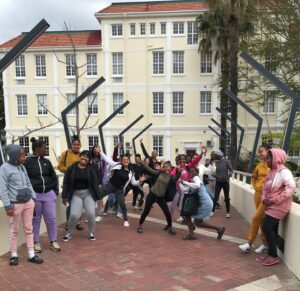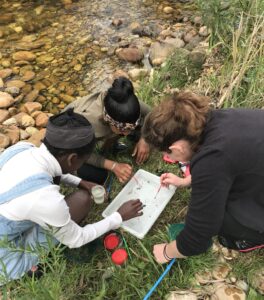A recent Iimbovane workshop gave 21 girls and five educators from the Cape Leopard Trust’s Girls in Conservation programme a glimpse of the biodiversity lurking in our rivers.
The workshop, which took place on the 6th of October 2022, was designed to better the girls’ understanding of the living and non-living components in freshwater ecosystems and how these components interact with each other. Although the girls do learn about ecology at school, there are not many opportunities for them to get out and get their feet wet.
After a fun ice-breaker activity, the girls were taught how to collect and identify aquatic plants and invertebrates from the Eerste River, in Stellenbosch. The girls further had to calculate the speed of the river, classify the riverbed, and investigate the riverbank for evidence of human activities, such as litter, invasive alien species, urban development, and agriculture – all of which they later used to evaluate the condition of the Eerste River.
The girls thoroughly enjoyed the hands-on river study – despite getting their shoes and pants wet in the process.
The next stop of the day was the campus of Stellenbosch University where the girls used microscopes to identify the teeny tiny critters.
After putting all their species lists and environmental data together, the girls gave a short presentation on their findings.
Then it was off to the university’s library so the girls could see where undergraduate and postgraduate students spend their time studying and doing research.
By visiting and experiencing the university’s facilities, the girls got a peek at what it takes to prepare for a career in conservation and ecology at a university.
The Girls in Conservation programme, an initiative of the Cape Leopard Trust, focusses on high school girls from rural communities and aims to get the learners to experience the natural environment and to introduce them to career possibilities within the Green Skills sector.
|
|
|

